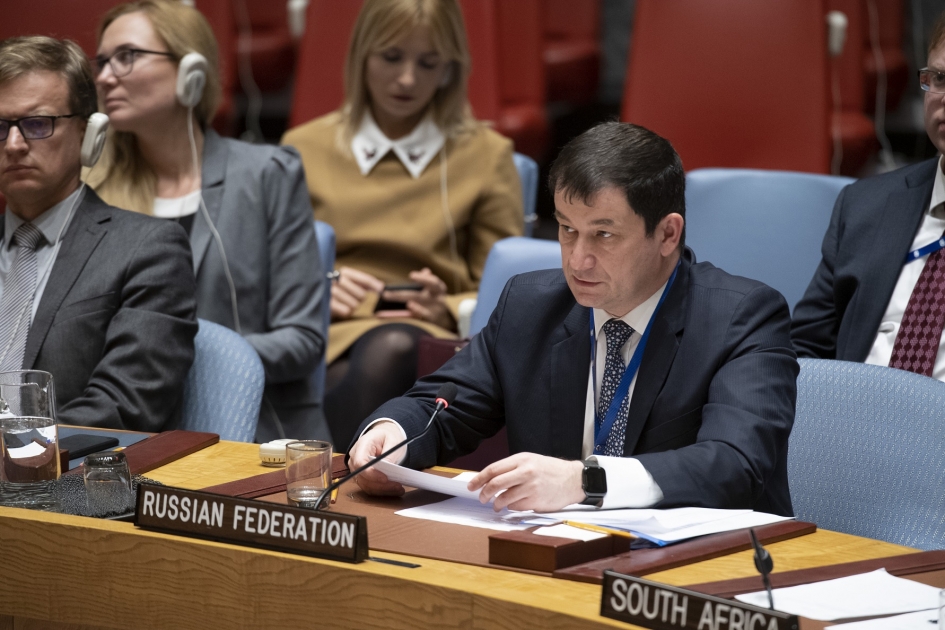Statement by First Deputy Permanent Representative Dmitry Polyanskiy at a Security Council briefing on the Central African region
Mm. President,
We thank Special Representative of the Secretary-General François Lonseny Fall for the assessments of the situation in the Central African region that he presented. We also closely followed the speech of Sasha Leznhev.
Russia unfailingly supports activity of the UN Office in Central Africa (UNOCA) as an important tool of preventive diplomacy.
Countries of this sub-region face challenges that have a complex nature. In this regard, it is vital that regionals should be at the forefront when it comes to crisis prevention and conflict settlement. We welcome commitment of the Economic Community of Central African States (ECCAS) to finalizing the institutional reform that should strengthen the potential of this organization that is vital for the sub-region.
Mm. President,
Central Africa plays a key role from the point of view of countering the spread of terrorism on the continent. Pervasion of radical and terrorist elements in this sub-region goes along with illicit trafficking in arms, drugs, natural resources, and mineral deposits.
We have been concerned by the information that “Boko Haram” preserves its assault capacity and is capable of high-profile acts. Activity of “Boko Haram” in Chad and Cameroon does not go down either. Extremists attack peaceful citizens, UN personnel, NGO representatives, military outposts.
We are also worried by the influx of foreign terrorists to “Boko Haram”, including militants from the “Islamic State”.
We attach special importance to regional efforts aimed at developing coordinated approaches to any manifestations of terrorism. Here is a good example – activity of the Multinational Joint Task Force. It is crucial to ensure its adequate financing.
On our part, we are ready to continue working in various formats in order to eradicate terrorist threat on the African continent. We pay specific attention to disclosing sources of financing of local terrorists, and their contacts with other international radical groups.
Mm. President,
We keep close track of developments in the Central African Republic. We support efforts taken by President F-A. Touadéra and directed at a prompt reform of the security sector and improvement of capacity of armed forces. The Political Agreement for Peace and Reconciliation in the CAR dated 6 February lays the groundwork for further settlement in the country. Russia will set forth assistance to national reconciliation by coordinating efforts with all those who are involved in searching for ways to normalize the situation.
Another instability factor in the Central African region is piracy in the Gulf of Guinea. Unfortunately, villainous attacks on foreign marine vessels continue, including attacks that take hostages. Our country has a positive experience of participation in international efforts that counter piracy in the North-West of the Indian Ocean – I mean the Contact Group on Piracy off the Coast of Somalia. We hope this expertise may be of help to respond to similar challenges that occur in the Gulf of Guinea.
We are concerned by unstopping activities of the “Lord's Resistance Army” that still undertakes looting and robberies in some areas of the CAR, the DRC and South Sudan. States of the Central Africa should not shift focus of their attention from combatting this group. We hope the concept of curbing this threat that is being elaborated under the auspices of the African Union and ECCAS will yield fruit.
Mm. President,
We follow the developments in Cameroon. The problem of Anglophone provinces is deeply rooted. Solution to the problems in Cameroon can only be found at the negotiation table, given compliance with the rule of law and observing of human rights. We call upon all sides in Cameroon to stay reserved and abandon any use of violence. In this regard, we welcome the nation-wide dialogue that was taking place from 30 September to 4 October. We hope recommendations that were articulated there will soon be put to life.
In conclusion, we would like to remind that threats and challenges that Central Africa encounters are closely interconnected, whereas African states are very interdependent. Destabilization of situation in one country might crush the security of neighboring states. That is why it is crucial not to cross the line between prevention and interference in internal affairs.
Thank you.
